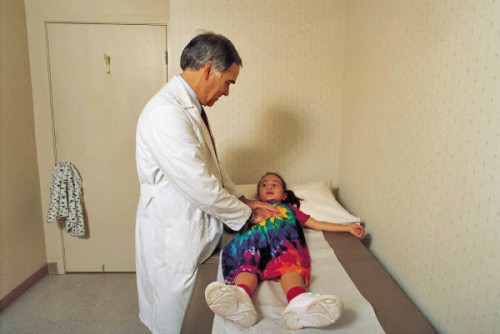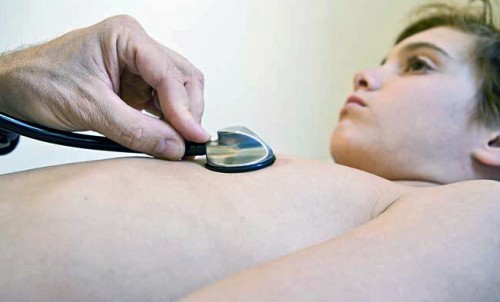The Pediatric Physical Examination
What would you say is the most common thing that a doctor does? You guessed it – a physical examination. And yet this one procedure has less standardization between doctors than almost anything else in medicine.
When you think of receiving a physical, what do you think of? I have come to realize that there’s more variety in what people expect during a physical exam than there is in what physicians give.
One time while I was in the navy I saw a boy for his pre-school physical. I had seen all of his brothers and sisters but never him.
During the physical exam, which was fairly complete, I found one little, small sign of a potentially serious problem.
The mother had not mentioned it to me during the history, so I pointed the problem out to her.
She surprised me with her answer as she exclaimed, “I knew that I should have taken him to the Health Center and not to you.”
Somewhat taken back, I explored the problem and found that surgery had been recommended previously, but the parents had decided against it.
She had assumed (and probably rightly so) that if the child had been seen at a screening clinic, this problem might not have been noticed; and, because she had seen me examine her other children, she had “worried” that I might notice the problem.
There is a definite mistaken impression here as to what the goal of a physical is.
It is not to create anxiety or problems, but rather to notice problems early, prevent problems from occurring, solve problems with the least amount of intervention, teach health maintenance skills and provide the examiner with a “base line” upon which to judge future changes and episodes of illness.
 In this case, the physical had done its job. It had picked up the heart problem early while relative minor procedures could correct it.
In this case, the physical had done its job. It had picked up the heart problem early while relative minor procedures could correct it.
What determines the type of physical that you or your child gets when you go to the doctor?
TIME is a big determinant. The first physical that I ever gave in my physical diagnosis class at medical school took 2 hours and 37 minutes!!!
I had worried about it for weeks previous and had prepared and studied and read and probably did about every physical test in the book that could be done.
When I was done I was absolutely, totally, completely, exhausted-not to mention what the little, elderly lady felt like. (I bet she never volunteered again!)
Obviously, I can do it a lot faster now, doing only the necessary general tests; looking at three or four things at once; working in a systematic order, etc.
Anything you can do to help your physician organize the time more efficiently will help you get a better physical.
Think about the problems beforehand and be able to express them all distinctly at the beginning of the exam and not sporadically through it as you “think about it”.
THE PHYSICIAN AND HIS EXPERIENCE is also important. Even in a general exam, a cardiologist will spend more time listening to the heart.
 I just realized while writing this article that I feel for the spleen in almost every patient. This is probably because I was trained in a center that saw a lot of children’s cancer. You wouldn’t expect a surgical specialist to give you a complete general exam.
I just realized while writing this article that I feel for the spleen in almost every patient. This is probably because I was trained in a center that saw a lot of children’s cancer. You wouldn’t expect a surgical specialist to give you a complete general exam.
THE PURPOSE OF THE EXAM also determines what the doctor does. Definitely if you are ill with an earache your doctor will hone in immediately on the acute problem.
When he does that, you should know that he is usually not considering all of the other general, physical-type problems.
So just because you have seen the doctor several times in a year does not, necessarily, mean you have had a complete screening physical.
Except in quite unusual circumstances, a physician does a complete screening exam on all new patients.
It might interest you to know what another physician expects when he goes in for a physical. It can be boiled down to a few basic principles.
You should expect to spend 15-20 minutes or more; have a good history taken and answer some fairly personal questions; get undressed and have everything either looked at, listened to, or felt; and have a final pronouncement of health with explanation and instructions as warranted.
The worth of a physical is directly proportional to how much time is spent, how many distractions there are, how much the doctor is trained to look for and doesn’t find (or does find), and how much is taught.
My opinion is that the $5 “el cheapo” mass screening physical isn’t worth the money; and, the rush-through boy scout/sports/induction center type group physical isn’t worth the time spent getting it.
Women should have routine pap smears. Men over 35-40 should probably have a rectal examination, and children the equivalent in completeness.
An old axiom in medicine, “If you don’t look for it, you won’t find it,” applies most appropriately to all the little things, like cancers, which are noticed during a good, thorough examination.
Advertisement by Google
(sorry, only few pages have ads)

